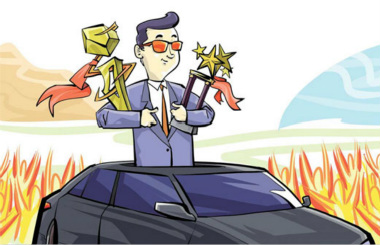Nuclear safety relies on more than just high-tech
Updated: 2016-01-28 07:46
(China Daily)
|
|||||||||||
 |
|
The Fuqing nuclear power plant is under construction.[Photo/China Daily] |
With proper safety guarantees, nuclear energy is a clean, efficient source of energy.
That is why Three Mile Island, Chernobyl, or, more recently, Fukushima have not prevented countries from pursing nuclear power generating capacities.
That is why it makes good economic and environmental sense for China to substantially boost its corresponding capabilities.
On one hand, it is a constant, and growing, power undersupply to deal with. On the other hand, its dependence on coal-burning power generation is a known cause of air pollution.
According to official documents, last year alone, nuclear power plants saved the country 53.74 million tons of standard coal, reducing carbon dioxide release by almost 141 million tons. That's a lot. And that was when nuclear power accounted for a meager 1.8 percent of our national power supply, compared to around 20 percent in the United States and Great Britain.
From the perspective of pollutants reduction alone, nuclear power deserves a much more prominent role in China. But the crucial premise is safety.
The Chinese nuclear industry has made impressive headway technology-wise, and maintained a by-and-large satisfactory safety record for decades.
But that safety record was achieved when nuclear power was approached with extreme prudence. No matter how technologically competent we become, that same degree of prudence remains indispensable today and in the future. Nuclear safety is never just about technology.
And, pride-worthy as it is, the domestic nuclear industry's safety record is not perfect.
None of our nuclear power generating units has suffered events or accidents rated above Level 2 under the International Nuclear and Radiological Event Scale, according to the white paper. But that does not exclude there being events below or at Level 2.
That justifies redoubled caution in the future, in the planning, building, and operating of nuclear facilities.
And as the number of nuclear facilities increase, it will highlight another risk, for which we remain relatively inexperienced, namely the safe disposal of nuclear waste.
That is why prudence must remain the watchword.
Related Stories
China confident of raising installed nuclear power capacity to 58 GW by 2020 2016-01-27 13:47
China plans to build offshore nuclear power plant 2016-01-27 13:36
China inks nuclear power partnership deal with Thailand 2015-12-24 16:36
China has world's largest nuclear power capacity under construction 2015-12-30 10:14
Today's Top News
UK adventurer dies on solo journey
Families of expats in China can stay longer
China's growth envy of developed world
Foreigners find hard to buy China's rail tickets
Rags to riches saga underlines China's transformation
Leaders address Iran's thirst for growth
UK's interest in China boosted by BBC TV series
Global push
Hot Topics
Lunar probe , China growth forecasts, Emission rules get tougher, China seen through 'colored lens', International board,
Editor's Picks

|

|

|

|

|

|






